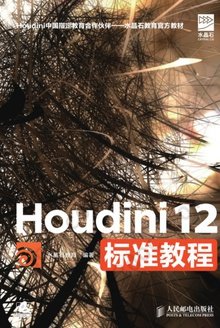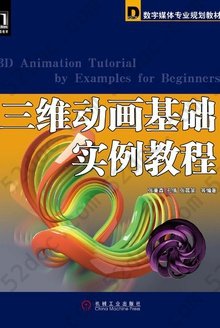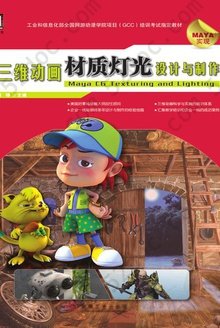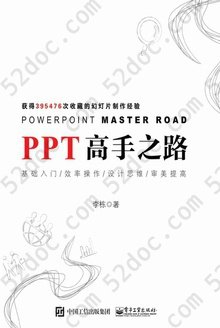注重体验与质量的电子书资源下载网站
分类于: 人工智能 设计
简介

动画声音设计 豆 7.6分
资源最后更新于 2020-10-27 12:21:59
作者:[美] Robin Beauchamp
译者:徐晶晶
出版社:人民邮电出版社
出版日期:2011-01
ISBN:9787115254054
文件格式: pdf
标签: 动画声音设计 动画 电影 音频 录音 好想好想 动漫 看过的书们
简介· · · · · ·
《动画声音设计》是一本详尽的动画电影声音设计指南,介绍了数字音频工作站软件、免费的下载资源、声音功能和设计理论以及声音力量,并提供各种声音设计的实例,使你的电影声轨更具感染力。《动画声音设计》的定位是针对叙事动画短片(narrative short-form animation)的声音制作指南。
《动画声音设计》的内容针对动画师,也适用于影像声音设计师。全书涵盖影像声音设计理论、声轨元素以及版权法等学术研究,也包括工作室组建和信号路由以及信号处理等技术细节,更从前、中、后三个阶段梳理动画声音设计理论和实践,并包含两个声音分析案例。无论是动画师,还是影像声音设计师都会从《动画声音设计》中有所收获。
目录
第一篇:基础理论(Foundations and Theory) 1
第1章 影像声音基础(Foundations of Audio for Image) 3
A.物理声学(The Physics of Sound) 3
1.概述 3
2.正弦波结构(The Anatomy of a Sine Wave) 4
3.频率(Frequency) 5
4.振幅(Amplitude) 6
5.音色(Timbre) 6
6.音量包络(Volume envelope) 6
7.波长(Wavelength) 7
8.声速(Speed of Sound) 8
B.声音感知(Perception of Sound) 8
1.听觉与倾听(Hearing versus Listening) 8
2.空间定义(Defining Space) 8
3.立体声声像定位(Stereo Imaging) 8
4.节奏与速度(Rhythm and Tempo) 9
5.噪声(Noise) 10
6.静音(Silence) 10
C.数字音频(Digital Audio) 10
1.声音拾录(Capturing Auido) 10
2.采样率(Sampling Rates) 11
3.比特深度(Bit-Depths) 12
4.脉冲调制编码(Linear Pluse Code Modulation) 12
5.多声道音频压缩(Muti-Channel Audio Compression) 13
6.MP3与acc(MPEG-1 Layer 3 And aacPLUS) 14
第2章 声音设计理论(Sound Design Theory) 15
A.概述 15
B.声音分类(Sound Classifications) 15
C.影像与声音处理的差异(Differences in Visual and Audio Processing) 16
D.声音对于时间感知的影响(Influence of Sound on Time Perception) 17
E.声音对于空间感知的影响(Influence of Sound on Spatial Perception) 17
F.吸引观众进入叙事情境(Drawing the Audience into the Narrative) 18
G.声音的人物塑造功能(Sound for Character Development) 18
H.神似与现实(Plausibility Versus Reality) 19
I.象征性声音(Metaphoric Sound) 19
J.画外音(Off-Screen Sound) 20
K.紧张与放松(Tension and Release) 20
L.平滑画面剪辑(Smoothing Visual Edits) 20
M.发展连续性(Developing Continuity) 21
N.认识画面剪辑和电影常规(Interpreting Picture Edits and Film Conventions) 21
O.知觉引导(Guided Perception) 23
P.小结(Conclusion) 23
第二篇:对白、音乐和音效The Stems:Dialigue, Music and effects (DM&E) 27
第3章 对白(Dialogue) 29
A.概述 29
B.叙述(Narration) 29
C.历史演讲(Historical Speeches) 30
D.合成语言(Synthetic Language) 30
E.对白和人物塑造(Dialog and Character Development) 30
F.对白和音乐(Dialog and Music) 31
G.知名动画配音演员(Historical Voice Talent in Animation) 31
H.选派配音演员(Casting Voice Talent) 32
I.与配音演员共事(Working with Voice Actors) 32
J.对白录制(Recording Dialog) 32
K.话筒(Microphone) 34
L.指向性(Polar Pattern) 34
M.话筒摆放(Microphone Placement) 35
N.对白录音评价(Evaluating Recorded Dialog) 35
O.合成与剪辑(Compositing and Editing) 37
P.同步(Synchronization) 37
Q.信号处理(Signal Processing) 37
1.修正策略(Corrective Measures) 38
2.声音塑形 (Sound Shaping) 39
3.窄频旁白(Futzing voice-over) 39
第4章 音乐(Music) 41
A.概述 41
B.音乐在动画片中所担当的角色(The Role of Music in Animation) 42
C.动画配乐大师(Historical Figures in Animation) 42
D.临时声轨(The Temp Track) 43
E.背景音乐(Underscore) 44
F.有源音乐(Source Music) 44
G.音乐效果和音响配乐(Music Effects and Effects Scoring) 44
H.音乐的情绪处理(Music for Emotional Treatment) 45
I.潜意配乐(Subtext Scoring) 45
J.音乐的连续性和时间感知应用(Music for Continuity and Time Perception) 45
K.场景和规模建立应用(Music to Establish Setting and Scale) 46
L.原声与合成乐器(Acoustic and Synthetic Instrumentation) 46
M.定点会议1(The Spotting Session) 46
N.配乐创作(Creating an Original Score) 47
O.配乐演示(Demonstrating the Score) 47
P.罐头音乐库(Production Music Libraries) 48
Q.罐头音乐库的选择列表(Selected List of Production Libraries) 50
R.创建配乐词汇(Developing a Vocabulary for Scoring) 51
1.情绪(By Emotion) 51
2.音乐风格(By Musical Styles) 54
3.电影类型(By Cinematic Genre) 55
4.乐器(By Musical Instrumentation) 56
S.音乐剪辑师(The Music Editor) 56
T.声音剪辑术语(Sound-Editing Terminology) 57
U.音乐剪辑(Music Editing) 58
第5章 音效(Sound effects) 63
A. 概述 63
B. 音效的功能(Functions of SFX) 63
C. 音效概念化(Conceptualizing SFX) 64
D. 音效的历史(The History of SFX) 64
E. 音效定点会议(SFX Spotting Session) 65
F. 音效源(Sources of SFX) 65
G. 商业音效库(Commercial SFX Libraries) 66
H. 拟音效果(Foley [Performance] Effects) 66
I. 环境声(背景)(Ambience [Backgrounds]) 67
J. 音效库搜索和试听(Searching and Auditioning SFX Libraries) 68
K. 音效词汇(The Vocabulary of SFX) 70
L. 创建一个罐头音效库(Creating a Production SFX Library) 70
M. 开发一套原创音效库(Developing an OriginalSFX Library) 71
N. 实地录音工具(Tools for Field Recording) 72
1.实地便携录音机(Field Recoring) 72
2.实地录音话筒(Field Microphones) 72
3.实地录音附件(Field Accessories) 75
O. 关于实地录音的建议(Suggestions for Recording in the Field) 76
P. 场地使用许可申请(Location Request) 78
Q. 录音室录音(Studio Recording) 78
R. 立体声录音技术(Stereo Recording Techniques) 79
M/S立体声(Middle-Side[M/S]Stereo) 79
S. 音效剪辑和修饰(SFX Editing and Sweetening) 81
T. 音效信号处理(SFX Signal Processing) 82
U. 同步(Synchronization) 82
第三篇:艺术版权法(Arts Law) 85
第6章 创建合法声轨(Developing a Legal Sound Track) 87
A.概述 87
B.版权与许可(Rights Versus License) 87
C.1976年美国版权法案(U.S. Copyright Act of 1976) 87
D.版权持有者授权的专属版权(Exclusive Rights Granted to Copyright Holders) 88
E.非专属权 [合理使用](Nonexclusive Rights [Fair Use]) 88
F.模仿讽刺(Parody) 89
G.公有领域 (Public Domain) 89
H.确定版权持有者(Locating the Copyright Holder) 89
1.美国版权局(U.S. Copyright Office) 89
2.版权管理组织(Performing Rights Organization) 89
I.同步许可(Synchronization License) 90
J.原版使用许可(Master License) 91
K.机械复制许可(Mechanical License) 93
L.影音许可(Videogram License) 93
M.侵权的潜在后果(Potential Consequence of Copyright Infringement) 93
N.常见问题(Frequently Asked Questions) 93
O.法律术语(Legal Terms) 95
P.寻求版权保护(Obtaining Copyright Protection) 96
Q.国际版权法(International Copyright Law) 96
第四篇:工具与技巧(Tools and Techniques) 99
第7章 工作室(The Project Studio) 101
A.概述 101
B.系统(Platform) 102
C.音频宿主软件(Host Audio Applications) 102
D.硬盘录音(Hard-Disk Recording) 103
E.波形剪辑(Waveform Editing) 104
F.自动量化(Automation) 104
G.桌面媒体播放器(Desktop Media Players) 104
H.MIDI音序器(MIDI Sequencers) 104
I.虚拟乐器:合成和采样(Virtual Instruments:Synthesis and Sampling) 105
J.音频编码(Audio Encoding) 105
K.DVD影碟制作(DVD-V Authoring) 106
L.素材交换(Media File Exchange[OMFI and AAF]) 107
M.音频接口(Audio Interface) 107
N.控制台(Control Surfaces) 108
O.监听音箱(Audio Monitors) 108
P.视频监视器(Video Monitors) 109
Q.音频线材和接口(Audio Cables and Connectors) 110
R.素材硬盘(Media Drives) 112
第8章 信号通路与信号处理(Signal Path and Signal Processing) 113
A.概述 113
B.信号通路(Signal Path) 113
1.声源(Audio Source) 114
2.插入(Inserts) 114
3.发送和辅助输入(Sends and Auxiliary Inputs) 115
4.推子前/推子后(Prefade/Postfade) 115
5.辅助输入(Auxiliary Inputs) 117
6.主输出(Master Out) 117
C.信号处理(Signal Processing) 117
1.插件(Plug-Ins) 117
2.效果渲染(Rendered Effects) 118
3.实时处理效果(Real-Time Effects) 119
4.声源质量准则(The Source-Quality Rule) 119
D.信号处理类型(Types of Signal Processing) 119
1.均衡(Equalization) 120
2.压缩(Compression) 121
3.混响(Reverb) 122
4.反转(Reverse) 123
5.音高修正(Pitch Shifting) 124
6.时间缩放工具(Time-Scaling) 124
7.多普勒效应(Doppler) 124
8.降噪(Noise Reduction) 125
第五篇:制作流程(The Production Path) 127
第9章 前期(Preproduction) 129
A.概述 129
B.前期阶段(Phases of Preproduction) 130
1.概念发展(concept development) 130
a.剧本分析:“倾听言外之意”:(Script Analysis:“Hearing Between the Lines”) 130
b.概念艺术(Concept Art) 130
c.脚本(treatment) 132
d.认识类型(Understanding Genre) 132
2.故事板(Storyboard) 132
3.设计临时声轨和预背景音乐(Developing the Temp Track and Pre-Score) 134
4.制作分镜样片(Producing the Animatic) 134
5.聘用声音设计师(Enlisting a Sound Designer) 134
6.确定发行格式(Determining the Release Format) 135
7.制定声音制作预算(Developing an Audio Production Budget ) 135
8.制定声音制作计划表(Developing an Audio Production Schedule) 136
9.保持同步(Maintaining Synchronization) 136
10.项目管理(Project Mangement) 137
11.工程管理(Session Mangement) 137
12.文件共享(File Sharing) 138
第10章 中期制作(Production) 141
A.概述 141
B.二维动画制作流程(Production Timeline for Two- Dimensional Animation) 141
C.三维计算机动画制作流程(Production Timeline for Three- Dimensional Computer Animation) 142
D.样片发展(The Evolving Workprint) 142
E.声音设计师的同期任务(Production Tasks for the Sound Designer) 143
1.声音研究(Audio Research) 143
2.音效收集(SFX Acquistion) 144
3.配乐构思(Score Consideration) 144
4.临时声轨(Temp Track) 144
5.组合音效(Built-Up[Sweetened] Sound Effects) 144
第11章 后期制作(Postproduction) 145
A.概述 145
B.创设声轨元素(Developing the Elements of a Sound Track) 145
C.预混(The Premixs) 145
D.终混(The Final Mix[Rerecording]) 146
E.认识声道和音箱(Understanding Channels and Loudspeakers) 146
F.立体声混录(The Stereo Mix) 147
G.多声道混录(The Multichannel Mix) 147
H.多声道声像(Multichannel Panning) 147
1.5.1声像:对白(Panning Dialogue in 5.1) 148
2.5.1声像:音效(Panning SFX in 5.1) 149
3.5.1声像:环境声(Panning Ambience in 5.1) 151
4.5.1声像:音乐(Panning music in 5.1) 151
I.终混阶段的信号处理(Signal Processing at the Final Mix) 152
J.混录电平设置(Setting Mix Levels) 152
K.母带处理(Mastering) 152
L.终混建议(Suggestions for the Final Mix) 153
M.声音发行格式(Sound Characteristics of Various Release Formats) 153
1.单声道(Mono Formats) 153
2.立体声(Stereo Formats) 154
3.多声道(Multichannel Formats) 154
N.声音设计和DVD-V菜单(Sound Design and the DVD-V Menu) 155
O.创建发行母版(Creating the Release Print) 155
第六篇:案例研究(Case Studies) 157
第12章 外婆家(Case Study: A Trip to Granny' s) 159
A.剧情概要(Synopsis) 159
B.制作概览(Production Overview) 159
C.对白分支(The Dialog stem) 160
1.烤箱广告(Verti-Broil Commerical) 160
2.忍者广告(Ninja Slug Commercial) 160
3.耶稣时刻(The Jesus Hour) 161
4.购物网(The Shopping Network) 161
5.时间流逝片段(Time-Lapse Sequence) 161
6.谷类食品 161
D.音乐分支(The Music Stem) 161
E.音效分支(The SFX Stem) 165
1.母亲的汽车 165
2.关车门 165
3.环境声 166
4.脚步声 166
5.鸟叫声 166
6.纱门 166
7.摔跤声 167
8.开大门声 167
9.开灯声 167
10.关大门声 167
11.钟声 167
12.烤面包机 167
13.外婆走路声 167
14.破碎的效果 167
15.沙发吱吱声 168
16.飞虫的声音 168
17.骑沙发的声音 168
18.空袭警报(Air-Raid Siren) 168
19.终结者 169
20.机器人装配线(Robot Assembly Line) 169
21.解码器手表 170
22.卡通片声音 170
23.画内声音 170
24.外婆的头崩裂声 170
25.梦境片段 170
26.盥洗间片段 171
27.假牙 171
28.机器人装配 171
29.汽车驶离 171
30.氛围声 172
31.外婆变形 172
32.片尾演职表(End Credits) 172
第13章 山姆(Case Study:Sam) 173
A.剧情概要(Synopsis) 173
B.制作概览(Production Overview) 173
C.对白分支(The Dialog stem) 174
1.无线电通讯(Radio Communication) 174
2.无线电通讯 174
D.音乐分支(The Music Stem) 174
E.音效分支 177
1.飞行跑道的环境声 177
2.跑道的垃圾声音 177
3.旋转片名字母 178
4.起重机 178
5.金属球体 178
6.货物装载 178
7.地勤货车 178
8.起飞片段1 179
9.环境声 179
10.吹风器 179
11.一组着陆镜头 180
12.地勤货车 180
13.飞行器卸货 180
14.驾驶舱伸展 180
15.飞行器的气流声 180
16.拟音(生气的飞行员) 180
17.职业编程磁碟 181
18.弹出磁碟 181
19.画内起重机 181
20.按键区 181
21.飞行器悬架 181
22.跑道环境声 181
23.脚步声拟音 182
24.磁碟读取声 182
25.学习片段 182
26.引擎启动 182
27.内景和外景的环境声 183
28.飞行器翻转 183
29.飞行器掠过 183
30.飞行器外部环境声 183
31.飞掠 184
32.警报声 184
33.学习弹出磁碟 184
34.按键 184
35.飞行器盘旋下降 184
36.驾驶舱环境声 184
37.飞行器动力消失 185
38.伸展机翼 185
39.引擎控制杆 185
40.飞掠和翻转 185
41.飞行器仪表盘的警报声 186
42.引擎声 186
43.着陆 186
44.号声 186
45.准备起飞 186
46.地勤货车 186
47.货车司机的脚步声拟音 187
48.最后的磁盘声音 187
49.环境声 187
拓展阅读 189
中英文对照表 193
译者后记 200
第1章 影像声音基础(Foundations of Audio for Image) 3
A.物理声学(The Physics of Sound) 3
1.概述 3
2.正弦波结构(The Anatomy of a Sine Wave) 4
3.频率(Frequency) 5
4.振幅(Amplitude) 6
5.音色(Timbre) 6
6.音量包络(Volume envelope) 6
7.波长(Wavelength) 7
8.声速(Speed of Sound) 8
B.声音感知(Perception of Sound) 8
1.听觉与倾听(Hearing versus Listening) 8
2.空间定义(Defining Space) 8
3.立体声声像定位(Stereo Imaging) 8
4.节奏与速度(Rhythm and Tempo) 9
5.噪声(Noise) 10
6.静音(Silence) 10
C.数字音频(Digital Audio) 10
1.声音拾录(Capturing Auido) 10
2.采样率(Sampling Rates) 11
3.比特深度(Bit-Depths) 12
4.脉冲调制编码(Linear Pluse Code Modulation) 12
5.多声道音频压缩(Muti-Channel Audio Compression) 13
6.MP3与acc(MPEG-1 Layer 3 And aacPLUS) 14
第2章 声音设计理论(Sound Design Theory) 15
A.概述 15
B.声音分类(Sound Classifications) 15
C.影像与声音处理的差异(Differences in Visual and Audio Processing) 16
D.声音对于时间感知的影响(Influence of Sound on Time Perception) 17
E.声音对于空间感知的影响(Influence of Sound on Spatial Perception) 17
F.吸引观众进入叙事情境(Drawing the Audience into the Narrative) 18
G.声音的人物塑造功能(Sound for Character Development) 18
H.神似与现实(Plausibility Versus Reality) 19
I.象征性声音(Metaphoric Sound) 19
J.画外音(Off-Screen Sound) 20
K.紧张与放松(Tension and Release) 20
L.平滑画面剪辑(Smoothing Visual Edits) 20
M.发展连续性(Developing Continuity) 21
N.认识画面剪辑和电影常规(Interpreting Picture Edits and Film Conventions) 21
O.知觉引导(Guided Perception) 23
P.小结(Conclusion) 23
第二篇:对白、音乐和音效The Stems:Dialigue, Music and effects (DM&E) 27
第3章 对白(Dialogue) 29
A.概述 29
B.叙述(Narration) 29
C.历史演讲(Historical Speeches) 30
D.合成语言(Synthetic Language) 30
E.对白和人物塑造(Dialog and Character Development) 30
F.对白和音乐(Dialog and Music) 31
G.知名动画配音演员(Historical Voice Talent in Animation) 31
H.选派配音演员(Casting Voice Talent) 32
I.与配音演员共事(Working with Voice Actors) 32
J.对白录制(Recording Dialog) 32
K.话筒(Microphone) 34
L.指向性(Polar Pattern) 34
M.话筒摆放(Microphone Placement) 35
N.对白录音评价(Evaluating Recorded Dialog) 35
O.合成与剪辑(Compositing and Editing) 37
P.同步(Synchronization) 37
Q.信号处理(Signal Processing) 37
1.修正策略(Corrective Measures) 38
2.声音塑形 (Sound Shaping) 39
3.窄频旁白(Futzing voice-over) 39
第4章 音乐(Music) 41
A.概述 41
B.音乐在动画片中所担当的角色(The Role of Music in Animation) 42
C.动画配乐大师(Historical Figures in Animation) 42
D.临时声轨(The Temp Track) 43
E.背景音乐(Underscore) 44
F.有源音乐(Source Music) 44
G.音乐效果和音响配乐(Music Effects and Effects Scoring) 44
H.音乐的情绪处理(Music for Emotional Treatment) 45
I.潜意配乐(Subtext Scoring) 45
J.音乐的连续性和时间感知应用(Music for Continuity and Time Perception) 45
K.场景和规模建立应用(Music to Establish Setting and Scale) 46
L.原声与合成乐器(Acoustic and Synthetic Instrumentation) 46
M.定点会议1(The Spotting Session) 46
N.配乐创作(Creating an Original Score) 47
O.配乐演示(Demonstrating the Score) 47
P.罐头音乐库(Production Music Libraries) 48
Q.罐头音乐库的选择列表(Selected List of Production Libraries) 50
R.创建配乐词汇(Developing a Vocabulary for Scoring) 51
1.情绪(By Emotion) 51
2.音乐风格(By Musical Styles) 54
3.电影类型(By Cinematic Genre) 55
4.乐器(By Musical Instrumentation) 56
S.音乐剪辑师(The Music Editor) 56
T.声音剪辑术语(Sound-Editing Terminology) 57
U.音乐剪辑(Music Editing) 58
第5章 音效(Sound effects) 63
A. 概述 63
B. 音效的功能(Functions of SFX) 63
C. 音效概念化(Conceptualizing SFX) 64
D. 音效的历史(The History of SFX) 64
E. 音效定点会议(SFX Spotting Session) 65
F. 音效源(Sources of SFX) 65
G. 商业音效库(Commercial SFX Libraries) 66
H. 拟音效果(Foley [Performance] Effects) 66
I. 环境声(背景)(Ambience [Backgrounds]) 67
J. 音效库搜索和试听(Searching and Auditioning SFX Libraries) 68
K. 音效词汇(The Vocabulary of SFX) 70
L. 创建一个罐头音效库(Creating a Production SFX Library) 70
M. 开发一套原创音效库(Developing an OriginalSFX Library) 71
N. 实地录音工具(Tools for Field Recording) 72
1.实地便携录音机(Field Recoring) 72
2.实地录音话筒(Field Microphones) 72
3.实地录音附件(Field Accessories) 75
O. 关于实地录音的建议(Suggestions for Recording in the Field) 76
P. 场地使用许可申请(Location Request) 78
Q. 录音室录音(Studio Recording) 78
R. 立体声录音技术(Stereo Recording Techniques) 79
M/S立体声(Middle-Side[M/S]Stereo) 79
S. 音效剪辑和修饰(SFX Editing and Sweetening) 81
T. 音效信号处理(SFX Signal Processing) 82
U. 同步(Synchronization) 82
第三篇:艺术版权法(Arts Law) 85
第6章 创建合法声轨(Developing a Legal Sound Track) 87
A.概述 87
B.版权与许可(Rights Versus License) 87
C.1976年美国版权法案(U.S. Copyright Act of 1976) 87
D.版权持有者授权的专属版权(Exclusive Rights Granted to Copyright Holders) 88
E.非专属权 [合理使用](Nonexclusive Rights [Fair Use]) 88
F.模仿讽刺(Parody) 89
G.公有领域 (Public Domain) 89
H.确定版权持有者(Locating the Copyright Holder) 89
1.美国版权局(U.S. Copyright Office) 89
2.版权管理组织(Performing Rights Organization) 89
I.同步许可(Synchronization License) 90
J.原版使用许可(Master License) 91
K.机械复制许可(Mechanical License) 93
L.影音许可(Videogram License) 93
M.侵权的潜在后果(Potential Consequence of Copyright Infringement) 93
N.常见问题(Frequently Asked Questions) 93
O.法律术语(Legal Terms) 95
P.寻求版权保护(Obtaining Copyright Protection) 96
Q.国际版权法(International Copyright Law) 96
第四篇:工具与技巧(Tools and Techniques) 99
第7章 工作室(The Project Studio) 101
A.概述 101
B.系统(Platform) 102
C.音频宿主软件(Host Audio Applications) 102
D.硬盘录音(Hard-Disk Recording) 103
E.波形剪辑(Waveform Editing) 104
F.自动量化(Automation) 104
G.桌面媒体播放器(Desktop Media Players) 104
H.MIDI音序器(MIDI Sequencers) 104
I.虚拟乐器:合成和采样(Virtual Instruments:Synthesis and Sampling) 105
J.音频编码(Audio Encoding) 105
K.DVD影碟制作(DVD-V Authoring) 106
L.素材交换(Media File Exchange[OMFI and AAF]) 107
M.音频接口(Audio Interface) 107
N.控制台(Control Surfaces) 108
O.监听音箱(Audio Monitors) 108
P.视频监视器(Video Monitors) 109
Q.音频线材和接口(Audio Cables and Connectors) 110
R.素材硬盘(Media Drives) 112
第8章 信号通路与信号处理(Signal Path and Signal Processing) 113
A.概述 113
B.信号通路(Signal Path) 113
1.声源(Audio Source) 114
2.插入(Inserts) 114
3.发送和辅助输入(Sends and Auxiliary Inputs) 115
4.推子前/推子后(Prefade/Postfade) 115
5.辅助输入(Auxiliary Inputs) 117
6.主输出(Master Out) 117
C.信号处理(Signal Processing) 117
1.插件(Plug-Ins) 117
2.效果渲染(Rendered Effects) 118
3.实时处理效果(Real-Time Effects) 119
4.声源质量准则(The Source-Quality Rule) 119
D.信号处理类型(Types of Signal Processing) 119
1.均衡(Equalization) 120
2.压缩(Compression) 121
3.混响(Reverb) 122
4.反转(Reverse) 123
5.音高修正(Pitch Shifting) 124
6.时间缩放工具(Time-Scaling) 124
7.多普勒效应(Doppler) 124
8.降噪(Noise Reduction) 125
第五篇:制作流程(The Production Path) 127
第9章 前期(Preproduction) 129
A.概述 129
B.前期阶段(Phases of Preproduction) 130
1.概念发展(concept development) 130
a.剧本分析:“倾听言外之意”:(Script Analysis:“Hearing Between the Lines”) 130
b.概念艺术(Concept Art) 130
c.脚本(treatment) 132
d.认识类型(Understanding Genre) 132
2.故事板(Storyboard) 132
3.设计临时声轨和预背景音乐(Developing the Temp Track and Pre-Score) 134
4.制作分镜样片(Producing the Animatic) 134
5.聘用声音设计师(Enlisting a Sound Designer) 134
6.确定发行格式(Determining the Release Format) 135
7.制定声音制作预算(Developing an Audio Production Budget ) 135
8.制定声音制作计划表(Developing an Audio Production Schedule) 136
9.保持同步(Maintaining Synchronization) 136
10.项目管理(Project Mangement) 137
11.工程管理(Session Mangement) 137
12.文件共享(File Sharing) 138
第10章 中期制作(Production) 141
A.概述 141
B.二维动画制作流程(Production Timeline for Two- Dimensional Animation) 141
C.三维计算机动画制作流程(Production Timeline for Three- Dimensional Computer Animation) 142
D.样片发展(The Evolving Workprint) 142
E.声音设计师的同期任务(Production Tasks for the Sound Designer) 143
1.声音研究(Audio Research) 143
2.音效收集(SFX Acquistion) 144
3.配乐构思(Score Consideration) 144
4.临时声轨(Temp Track) 144
5.组合音效(Built-Up[Sweetened] Sound Effects) 144
第11章 后期制作(Postproduction) 145
A.概述 145
B.创设声轨元素(Developing the Elements of a Sound Track) 145
C.预混(The Premixs) 145
D.终混(The Final Mix[Rerecording]) 146
E.认识声道和音箱(Understanding Channels and Loudspeakers) 146
F.立体声混录(The Stereo Mix) 147
G.多声道混录(The Multichannel Mix) 147
H.多声道声像(Multichannel Panning) 147
1.5.1声像:对白(Panning Dialogue in 5.1) 148
2.5.1声像:音效(Panning SFX in 5.1) 149
3.5.1声像:环境声(Panning Ambience in 5.1) 151
4.5.1声像:音乐(Panning music in 5.1) 151
I.终混阶段的信号处理(Signal Processing at the Final Mix) 152
J.混录电平设置(Setting Mix Levels) 152
K.母带处理(Mastering) 152
L.终混建议(Suggestions for the Final Mix) 153
M.声音发行格式(Sound Characteristics of Various Release Formats) 153
1.单声道(Mono Formats) 153
2.立体声(Stereo Formats) 154
3.多声道(Multichannel Formats) 154
N.声音设计和DVD-V菜单(Sound Design and the DVD-V Menu) 155
O.创建发行母版(Creating the Release Print) 155
第六篇:案例研究(Case Studies) 157
第12章 外婆家(Case Study: A Trip to Granny' s) 159
A.剧情概要(Synopsis) 159
B.制作概览(Production Overview) 159
C.对白分支(The Dialog stem) 160
1.烤箱广告(Verti-Broil Commerical) 160
2.忍者广告(Ninja Slug Commercial) 160
3.耶稣时刻(The Jesus Hour) 161
4.购物网(The Shopping Network) 161
5.时间流逝片段(Time-Lapse Sequence) 161
6.谷类食品 161
D.音乐分支(The Music Stem) 161
E.音效分支(The SFX Stem) 165
1.母亲的汽车 165
2.关车门 165
3.环境声 166
4.脚步声 166
5.鸟叫声 166
6.纱门 166
7.摔跤声 167
8.开大门声 167
9.开灯声 167
10.关大门声 167
11.钟声 167
12.烤面包机 167
13.外婆走路声 167
14.破碎的效果 167
15.沙发吱吱声 168
16.飞虫的声音 168
17.骑沙发的声音 168
18.空袭警报(Air-Raid Siren) 168
19.终结者 169
20.机器人装配线(Robot Assembly Line) 169
21.解码器手表 170
22.卡通片声音 170
23.画内声音 170
24.外婆的头崩裂声 170
25.梦境片段 170
26.盥洗间片段 171
27.假牙 171
28.机器人装配 171
29.汽车驶离 171
30.氛围声 172
31.外婆变形 172
32.片尾演职表(End Credits) 172
第13章 山姆(Case Study:Sam) 173
A.剧情概要(Synopsis) 173
B.制作概览(Production Overview) 173
C.对白分支(The Dialog stem) 174
1.无线电通讯(Radio Communication) 174
2.无线电通讯 174
D.音乐分支(The Music Stem) 174
E.音效分支 177
1.飞行跑道的环境声 177
2.跑道的垃圾声音 177
3.旋转片名字母 178
4.起重机 178
5.金属球体 178
6.货物装载 178
7.地勤货车 178
8.起飞片段1 179
9.环境声 179
10.吹风器 179
11.一组着陆镜头 180
12.地勤货车 180
13.飞行器卸货 180
14.驾驶舱伸展 180
15.飞行器的气流声 180
16.拟音(生气的飞行员) 180
17.职业编程磁碟 181
18.弹出磁碟 181
19.画内起重机 181
20.按键区 181
21.飞行器悬架 181
22.跑道环境声 181
23.脚步声拟音 182
24.磁碟读取声 182
25.学习片段 182
26.引擎启动 182
27.内景和外景的环境声 183
28.飞行器翻转 183
29.飞行器掠过 183
30.飞行器外部环境声 183
31.飞掠 184
32.警报声 184
33.学习弹出磁碟 184
34.按键 184
35.飞行器盘旋下降 184
36.驾驶舱环境声 184
37.飞行器动力消失 185
38.伸展机翼 185
39.引擎控制杆 185
40.飞掠和翻转 185
41.飞行器仪表盘的警报声 186
42.引擎声 186
43.着陆 186
44.号声 186
45.准备起飞 186
46.地勤货车 186
47.货车司机的脚步声拟音 187
48.最后的磁盘声音 187
49.环境声 187
拓展阅读 189
中英文对照表 193
译者后记 200








